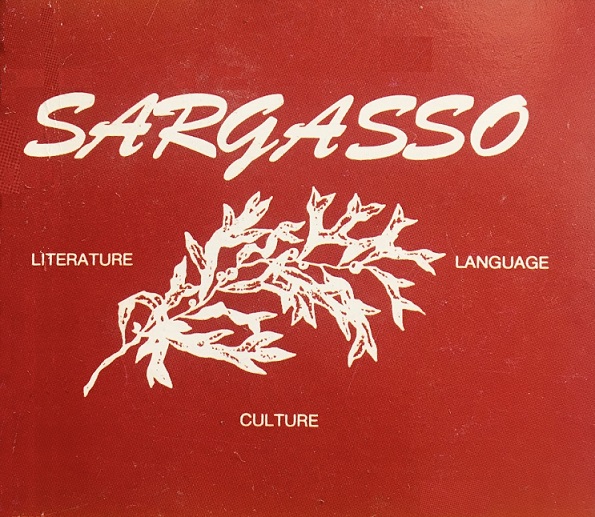
Guest editor Elidio La Torre Lagares [author of Hyperglossia and the Novel: The Production of (Non) Space, 2025] shares a call for papers for the next volume of Sargasso: “Post-Narrative Futures in Caribbean Letters and Cultures.” The deadline for submission of abstracts and bios is October 31, 2025.
Description: The editors of Sargasso invite submissions for a volume on post-narrative futures in Caribbean letters and cultures that will engage works of literature, art, and culture that challenge, subvert, reimagine, and transcend, dominant colonial, postcolonial, and traditional forms of narrative.
By “post-narrative,” we mean not the abandonment of storytelling but its reconfiguration: a refusal of closure, a practice of intermedial experimentation, and an archipelagic poetics that disperses authority, bends temporality, and exceeds the limits of linear plot. Post-narratives emerge as forms of errantry, fracture, and polyphony, illuminating the ways Caribbean expression unsettles narrative as container and transforms it into relation, fugue, and open-ended becoming.
Inspired by Édouard Glissant’s vision of relation and opacity, Maryse Condé’s polyphonic and fragmentary fictions, and Achille Mbembe’s theory of entangled temporalities, this volume centers on how Caribbean peoples articulate new forms of narration and identity that privilege complexity, hybridity, and openness, favoring movement and errantry to the Aristotelean form of narratives. It invites us to ponder the ways in which Caribbean post-narrative futures critically relate to the legacies of colonialism, slavery, and articulations of global power by exploring histories, identities, and cultural expressions that situate language and voice beyond linear forms or fixed approaches to storytelling.
The pathways imagined here are intimately connected to the work of Caribbean figures who have brought together creativity, theory, and the emergence of new relationships with place, time and each other. As Glissant reminds us in Poetics of Relation, “Errantry follows neither an arrowlike trajectory nor one that is circular and repetitive, nor is it mere wandering… in errantry one knows at every moment where one is—at every moment in relation to the other… so that it enters the spiraling, transformative mode of Relation, in which every voice can be heard and all can be said.” In a parallel register, Mbembe writes in On the Postcolony: “[T]ime is not a series but an interlocking of presents, pasts, and futures… each age bearing, altering, and maintaining the previous ones.” Post-narratives act as a form of fugue state, as Fred Moten makes clear in Black and Blu when he posits, “Constant escape is an ode to impurity, an obliteration of the last word. We remain to insist upon this errant, interstitial insistence.”
Maryse Condé’s novels, from Crossing the Mangrove to I, Tituba, Black Witch of Salem, also embody this aesthetic by dispersing narrative authority, fracturing temporality, and foregrounding opacity as resistance. Their formal metaphors illuminate what Caribbean writing has long enacted in practice: nonlinear, rhythmic, fractal, and archipelagic modes of storytelling.
This call engages with more recent conversations in Caribbean thought: the rise of Caribbean digital humanities and its challenges to textual boundaries; Afrofuturist imaginaries that open speculative horizons beyond colonial temporalities; ecological critiques that situate Caribbean writing within the global Anthropocene; and queer and posthuman poetics that foreground bodies, affects, and identities as unsettled and relational. Together, these emerging directions underscore the timeliness of asking what “post-narrative” might mean for Caribbean letters today.
This constellation of interventions casts the post-narrative as an embrace of multiplicity, opacity, entanglement, and the refusal of closure. We sail the open boat. In the midst of contemporary crises—climate catastrophe, mass migration, digital saturation, and the intensification of global inequalities—Caribbean post-narrative futures invite us to imagine forms of expression and solidarity adequate to entangled, uncertain times. They remind us that the refusal of closure is also an act of survival, creativity, and justice.
In the light of this, we seek academic essays that engage dialogically with these and related topics: 1) Caribbean novels—such as Condé’s Crossing the Mangrove—that disrupt linear storytelling through discontinuity, fragmentation, or multiplicity; 2) Ways in which opacity (Glissant) and blur (Moten) function as narrative techniques that resist colonial transparency and demand new reading practices; 3) Caribbean post-narrative forms that embody Mbembe’s sense of entangled time, where past, present, and future interlock rather than progress linearly; 4) Disfigurement of colonial chronologies to generate futures that are spectral, recursive, or archipelagic; 5) Caribbean fiction that enacts Glissant’s notion of relation as an “assemblage of dissimilars”; 6) Linguistic hybridity, creolization, or polyglossia as post-narrative strategies; 7) Post-narratives that open decolonial futures and resist both nationalist homogenization and neoliberal teleologies of “development”; 9) Caribbean writers who refuse closure, coherence, and or the single story; 10) Post-narratives in the arts that reimagine community, resistance, and justice in fragmented and open-ended ways; 11) Narrative forms that exceed the container—entering performance, sound, visual art, or digital media—as a post-narrative practice; and 12) Intermedial experiments (e.g., hypertext, montage, performance, carnival, music) that extend the Caribbean writer’s refusal of linear plot
Submission Details: We welcome scholarly essays, creative writing (poetry, short stories), interviews, translations, and visual art addressing these or related themes. Essays should be 5,000 to 7,000 words in length and conform to MLA Handbook (9th edition) formatting. Submissions can be made in English, Spanish, French, Haitian Creole, or Papiamentu.
Please submit a 200-word abstract and a brief bio (max. 150 words) in either English or Spanish to the guest editor, Elidio La Torre Lagares, at sargassojournal@gmail.com by October 31, 2025. Abstract feedback and further information will be provided to selected contributors. Full submissions—essays, creative works, and artworks—are due by January 15, 2026.
Guest editor Elidio La Torre Lagares [author of Hyperglossia and the Novel: The Production of (Non) Space, 2025] shares a call for papers for the next volume of Sargasso: “Post-Narrative Futures in Caribbean Letters and Cultures.” The deadline for submission of abstracts and bios is October 31, 2025. Description: The editors of Sargasso invite submissions
